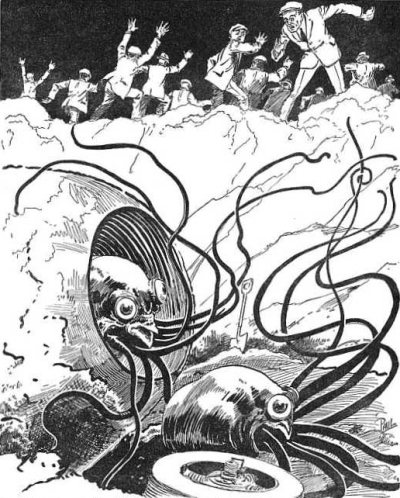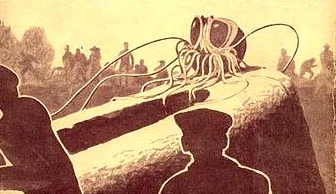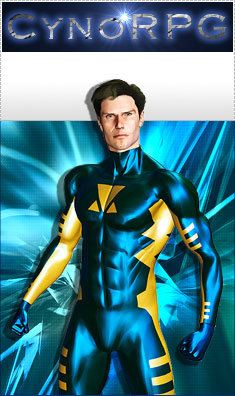Martian
The Martians are best described by an actual account of meeting one in person:
A big greyish rounded bulk, the size, perhaps, of a bear, was rising slowly and painfully out of the cylinder. As it bulged up and caught the light, it glistened like wet leather.
Two large dark-coloured eyes were regarding me steadfastly. The mass that framed them, the head of the thing, was rounded, and had, one might say, a face. There was a mouth under the eyes, the lipless brim of which quivered and panted, and dropped saliva. The whole creature heaved and pulsated convulsively. A lank tentacular appendage gripped the edge of the cylinder, another swayed in the air.
Those who have never seen a living Martian can scarcely imagine the strange horror of its appearance. The peculiar V-shaped mouth with its pointed upper lip, the absence of brow ridges, the absence of a chin beneath the wedgelike lower lip, the incessant quivering of this mouth, the Gorgon groups of tentacles, the tumultuous breathing of the lungs in a strange atmosphere, the evident heaviness and painfulness of movement due to the greater gravitational energy of the earth--above all, the extraordinary intensity of the immense eyes--were at once vital, intense, inhuman, crippled and monstrous. There was something fungoid in the oily brown skin, something in the clumsy deliberation of the tedious movements unspeakably nasty. Even at this first encounter, this first glimpse, I was overcome with disgust and dread.

They were, I now saw, the most unearthly creatures it is possible to conceive. They were huge round bodies--or, rather, heads--about four feet in diameter, each body having in front of it a face. This face had no nostrils--indeed, the Martians do not seem to have had any sense of smell, but it had a pair of very large dark-coloured eyes, and just beneath this a kind of fleshy beak. In the back of this head or body--I scarcely know how to speak of it--was the single tight tympanic surface, since known to be anatomically an ear, though it must have been almost useless in our dense air. In a group round the mouth were sixteen slender, almost whiplike tentacles, arranged in two bunches of eight each. These bunches have since been named rather aptly, by that distinguished anatomist, Professor Howes, the _hands_. Even as I saw these Martians for the first time they seemed to be endeavouring to raise themselves on these hands, but of course, with the increased weight of terrestrial conditions, this was impossible. There is reason to suppose that on Mars they may have progressed upon them with some facility.
The internal anatomy, I may remark here, as dissection has since shown, was almost equally simple. The greater part of the structure was the brain, sending enormous nerves to the eyes, ear, and tactile tentacles. Besides this were the bulky lungs, into which the mouth opened, and the heart and its vessels. The pulmonary distress caused by the denser atmosphere and greater gravitational attraction was only too evident in the convulsive movements of the outer skin.
And this was the sum of the Martian organs. Strange as it may seem to a human being, all the complex apparatus of digestion, which makes up the bulk of our bodies, did not exist in the Martians. They were heads--merely heads. Entrails they had none. They did not eat, much less digest. Instead, they took the fresh, living blood of other creatures, and _injected_ it into their own veins. I have myself seen this being done, as I shall mention in its place. But, squeamish as I may seem, I cannot bring myself to describe what I could not endure even to continue watching. Let it suffice to say, blood obtained from a still living animal, in most cases from a human being, was run directly by means of a little pipette into the recipient canal. . . .
The physiological advantages of the practice of injection are undeniable, if one thinks of the tremendous waste of human time and energy occasioned by eating and the digestive process. Our bodies are half made up of glands and tubes and organs, occupied in turning heterogeneous food into blood. The digestive processes and their reaction upon the nervous system sap our strength and colour our minds. Men go happy or miserable as they have healthy or unhealthy livers, or sound gastric glands. But the Martians were lifted above all these organic fluctuations of mood and emotion.
In three other points their physiology differed strangely from ours. Their organisms did not sleep, any more than the heart of man sleeps. Since they had no extensive muscular mechanism to recuperate, that periodical extinction was unknown to them. They had little or no sense of fatigue, it would seem. On earth they could never have moved without effort, yet even to the last they kept in action. In twenty-four hours they did twenty-four hours of work, as even on earth is perhaps the case with the ants.

In the next place, wonderful as it seems in a sexual world, the Martians were absolutely without sex, and therefore without any of the tumultuous emotions that arise from that difference among men. A young Martian, there can now be no dispute, was really born upon earth during the war, and it was found attached to its parent, partially _budded_ off, just as young lilybulbs bud off, or like the young animals in the fresh-water polyp.
The Martians had what appears to have been an auditory organ, a single round drum at the back of the head-body, and eyes with a visual range not very different from ours except that, according to Philips, blue and violet were as black to them.
And I assert that I watched them closely time after time, and that I have seen four, five, and (once) six of them sluggishly performing the most elaborately complicated operations together without either sound or gesture. Their peculiar hooting invariably preceded feeding; it had no modulation, and was, I believe, in no sense a signal, but merely the expiration of air preparatory to the suctional operation. I have a certain claim to at least an elementary knowledge of psychology, and in this matter I am convinced--as firmly as I am convinced of anything--that the Martians interchanged thoughts without any physical intermediation. And I have been convinced of this in spite of strong preconceptions.
The Martians wore no clothing. Their conceptions of ornament and decorum were necessarily different from ours; and not only were they evidently much less sensible of changes of temperature than we are, but changes of pressure do not seem to have affected their health at all seriously. Yet though they wore no clothing, it was in the other artificial additions to their bodily resources that their great superiority over man lay. We men, with our bicycles and road-skates, our Lilienthal soaring-machines, our guns and sticks and so forth, are just in the beginning of the evolution that the Martians have worked out. They have become practically mere brains, wearing different bodies according to their needs just as men wear suits of clothes and take a bicycle in a hurry or an umbrella in the wet. And of their appliances, perhaps nothing is more wonderful to a man than the curious fact that what is the dominant feature of almost all human devices in mechanism is absent--the _wheel_ is absent; among all the things they brought to earth there is no trace or suggestion of their use of wheels. One would have at least expected it in locomotion. And in this connection it is curious to remark that even on this earth Nature has never hit upon the wheel, or has preferred other expedients to its development. And not only did the Martians either not know of (which is incredible), or abstain from, the wheel, but in their apparatus singularly little use is made of the fixed pivot or relatively fixed pivot, with circular motions thereabout confined to one plane. Almost all the joints of the machinery present a complicated system of sliding parts moving over small but beautifully curved friction bearings. And while upon this matter of detail, it is remarkable that the long leverages of their machines are in most cases actuated by a sort of sham musculature of the disks in an elastic sheath; these disks become polarised and drawn closely and powerfully together when traversed by a current of electricity. In this way the curious parallelism to animal motions, which was so striking and disturbing to the human beholder, was attained. Such quasi-muscles abounded in the crablike handling-machine which, on my first peeping out of the slit, I watched unpacking the cylinder. It seemed infinitely more alive than the actual Martians lying beyond it in the sunset light, panting, stirring ineffectual tentacles, and moving feebly after their vast journey across space.


